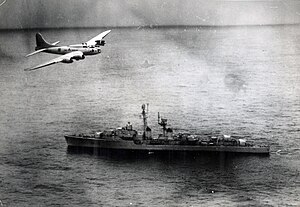| Lobster War | |||||||
|---|---|---|---|---|---|---|---|
 A Brazilian Air Force Boeing B-17 Flying Fortress flying over the French escort vessel Tartu, off the coast of Brazil in 1963. | |||||||
| |||||||
| Belligerents | |||||||
|
|
| ||||||
| Commanders and leaders | |||||||
|
|
| ||||||
| Units involved | |||||||
|
|
| ||||||
| Strength | |||||||
|
Brazilian Navy fleet in the dispute zone: 2 Cruisers 1 Submarine Brazilian Air Force: 1 Squadron
1 Squadron |
Offshore Brazil:
1 Aviso
Offshore West Africa: 1 Cruiser Second Escort squadron
1 Tanker
| ||||||
| Casualties and losses | |||||||
| None[1][2][3] | None[4] | ||||||
The Lobster War (also known as the Lobster Operation; Portuguese: Guerra da Lagosta; French: Conflit de la langouste) was a dispute over spiny lobsters that occurred from 1961 to 1963 between Brazil and France. The Brazilian government refused to allow French fishing vessels to catch spiny lobsters 100 miles (160 km) off Brazil's northeastern coast[5] by arguing that lobsters "crawl along the continental shelf". The French maintained that "lobsters swim" and so they could be caught by any fishing vessel from any country. The dispute was resolved unilaterally by Brazil, which extended its territorial waters to a 200-nautical-mile (370 km; 230 mi) zone and took in the disputed lobsters' bed.[6]
Although the historical incident of coercive diplomacy may have taken place long before the drafting of the United Nations Convention on the Law of the Sea, the dispute ended with the signing of an agreement on 10 December 1964[4] that granted to 26 French ships the right to fish for a period no longer than five years if they delivered to Brazilian fishermen a certain amount of profit from their fishing activities in the so-called "designated areas".[4]
- ^ Braga, Cláudio da Costa (2009). A Guerra da Lagosta. Armazém das Letras. pp. 90–165–166–167. ISBN 978-8590479017.
- ^ "O dia em que a lagosta virou peixe". FAB Ministério da Defesa. Retrieved 2023-04-02.
- ^ "Navios de Guerra Brasileiros". Navios Brasileiros. Retrieved 2023-04-02.
- ^ a b c Rainer Lagoni; Peter Ehlers; Marian Paschke; Duygu Damar (2011). Recent developments in the law of the sea. LIT Verlag Münster. p. 26. ISBN 978-3-643-10946-0.
- ^ AP (25 Feb 1963). "France Recalls Ship Sent to Lobster War". The Milwaukee Journal: 22. Retrieved 20 February 2012.
- ^ Osmańczyk, Edmund Jan; Mango, Anthony (2004). Encyclopedia of the United Nations and International Agreements. Vol. 2 G-M. Routledge. p. 1334. ISBN 0415939224..